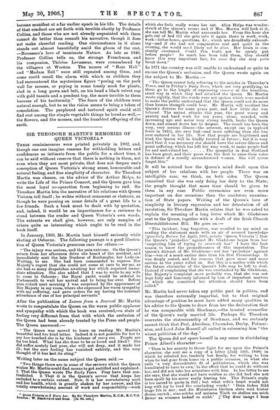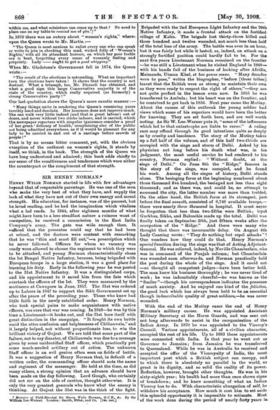SIR THEODORE MARTIN'S MEMORIES OF QUEEN VICTORIA.*
THESE reminiscences were printed privately in 1902, and,
though one can imagine reasons for withholding letters and confidences so intimate from the public for a short time, it can be said without reserve that there is nothing in them, not even when they are most private, that does not deepen one's conception of Queen Victoria's strong sense, honourable and natural feeling, and fine simplicity of character. Sir Theodore Martin was chosen, on the advice of Sir Arthur Helps, to write the Life of the Prince Consort, and the Queen gave him the most loyal co-operation from beginning to end. Sir Theodore Martin lets the narrative of his relations with Queen Victoria tell itself ; he writes without ornament or rhetoric, as though be were passing on some details of a great life to a few friends. Such a book must be dealt with by quotation, and, indeed, it would be an impertinence for a reviewer to stand between the reader and Queen Victoria's own words.
The extracts we shall give, however, are only samples of others quite as interesting which ought to be read in the book itself.
In January, 1868, Mr. Martin hurt himself seriously while skating at Osborne. The following passage is a good illustra- tion of Queen Victoria's generous care for others:—
" The injury was serious, and the rein extreme. On the Queen's return from her afternoon drive she heard of the accident, and immediately sent the late Duchess of Roxbttrghe, her Lady-in- Waiting, to me. She had been commanded to express Her Majesty's regret that she could not come at once to see me, as she had so many despatches awaiting her which required imme- diate attention. She also added that I was to write to my wife to come to Osborne ; the Royal yacht would be ordered to Portsmouth to wait her arrival and to bring her over. Before nine o'clock next morning I was surprised by the appearance of Her Majesty in my room, where she expressed her warm sympathy with my suffering, and gave orders for my having the constant attendance of one of her principal servants."
After the publication of Leaves front a Journal Mr. Martin wrote to congratulate the Queen on the warm public applause
and sympathy with which the book was received,—a state of feeling very different from that with which the seclusion of the Queen had been already treated by the Press and people. The Queen answered:—
" The Queen was moved to tears on reading Mr. Martin's beautiful and too kind letter. Indeed it is not possible for her to say how touched she is by the kindness of every one. People are far too kind. What has she done to be so loved and liked ? She did suffer acutely last year, she will not deny, and it made her ill; but the sore feeling has vanished entirely, and the very thought of it has last its sting."
Writing later on the same subject the Queen said :—
" Two things there are in some of the reviews which the Queen wishes Mr. Martin could find means to get rectified and explained : 1. That the Queen wrote The Early Years. Pray have that con- tradicted. 2. That it is the Queen's sorrow that keeps her secluded to a certain extent. Now, it is her overwhelming work and her health, which is greatly shaken by her sorrow, and the totally overwhelming amount of work and responsibility—work L:actain Victoria as I Knew her. By air Theodore Martin. 1E.C.V.O. : W. Blackwood and Sons. N. 6d. net.] • which she feels really wears her out. Alice Helps was wonder- struck at the Queen's !Tem.; and if Mrs. Martin will look at it, she can tell Mr. Martin what surrounds her. From the hour she gets out of bed till she gets into it again- there is work, work, work—letter-boxes, questions, ck.c., which are dreadfully exhaust- ing—and if she had not comparative rest and quiet in the evening, she would inost likely not be alive. Her brain is con- stantly overtaxed. Could this truth not be openly put before people? So much has been told them, they should know this very important fact, for S01114 day she may quits break down."
In 1871 the country was still unable to understand or quite to excuse the Queen's seclusion, and the Queen wrote again on the subject to Mr. Martin :— "The Queen cannot help referring to the articles in Thursday's Times, and in Friday's Daily News, which are very gratifying, as these go to the length of expressing remorse at the heartless, cruel way in which they had attacked the Queen. Mr. Martin wrote rightly, that the words were not spoken which were needed to make the public understand that the Queen could not do more than human strength could bear. Mr. Martin will recollect tho Queen's distress for some years past, and how little she was believed. The unjust attacks this year, the great worry and anxiety and hard work for ten years, alone, unaided, with increasing age and never very strong health, broke the Queen down, and almost drove her to despair. Tho result has been the very, very serious illness—the severest, except one (a typhoid fever in 1835), she ever had—and more suffering than she has ever endured in her life. Now that people are frightened and kind, the Queen will be kindly treated in future ; but it is very hard that it was necessary she should have the severe illness and great suffering, which has left her very weak, to make people feel
for and understand her The sympathy in dear Scotland has been great, and their press was the first to raise their voice in defence of a cruelly misunderstood woman. She will never forget this."
It will be noticed how the Queen's mind dwelt upon this subject of her relations with her people. There was an intelligible case, we think, on both sides. The Queen conceived that she was only doing her duty to the State; the people thought that more time should be given to them in any case. Public ceremonies are even more important on due occasions than the assiduous exatnina- lion of State papers. Writing of the Queen's love of simplicity in literary expression and her detestation of all involution, Sir Theodore Martin relates that he was asked to explain the meaning of a long letter which Mr. Gladstone sent to the Queen, together with a draft of the Irish Church Disestablishment Bill. He goes on :— " This incident, long forgotten, was recalled to my mind on reading the statement made with an air of assured knowledge [Quarterly Review for April, 1901, article 'Queen Victoria'] that the Queen's ' prejudice ' against Mr. Gladstone began from her 'suspecting him of trying to overwork her.' I have the best reason to know the groundlessness of this imputation. The Queen's distrust of Mr. Gladstone—not her 'prejudice' against him—was of a much earlier date than his first Premiership. It was deeply seated, and for reasons that grew more and more serious as the years rolled on. But this is a matter with which the future chronicler of the Queen's Life may be left to deal. Instead of complaining that she was overtasked by Mr. Gladstone, Her Majesty's complaint more probably was, that she was not kept fully and timeously informed by him of important matters to which she conceived her attention should have been called."
Mr. Martin had never taken any public part in politics, and was therefore externally impartial, but to that original advantage of position he must have added many qualities in his advice to the Queen to draw from her the declaration that he was comparable with Stockmar,—the trusted counsellor of the Queen's early married life. Perhaps Sir Theodore overrates the statesmanship of Stockmar, and we certainly cannot think that Peel, Aberdeen, Clarendon, Derby, Palmer- ston, and Lord John Russell all united in esteeming him "the
wisest politician of the day." The Queen did not spare herself in any sense in elucidating Prince Albert's character :-
"Thus in her anxiety to throw light for me upon the Prince's character, she sent me a copy of a letter (July 13th, 1848) in which he rebuked her, tenderly but firmly, for writing to him when he had gone from home on a public occasion, in what she calls 'a very discreditable fit of pettishness, which she was humiliated to have to own,' to the effect that lie could do without her, and did not take her miniature with him. In her letter to me she says, that she would not have written as she did had she not been spoilt by his never really leaving Ii4r. The Prince's -reply is too sacred to quote in full ; but what wife's heart would not leap with joy to read the concluding words ? Dein liebes Mid trago Ich in mir ; und die Miniaturen bleiben ateta welt hinter diesen zureck; eine Belch° auf meinem Tisch zu stellen urn :nick Deiner an grinners beds& es nicht.' r Thy dear image I bear
within me, and what miniature can, come up to that ? No need to place one on my table to remind me of ybetil" •
In 1870 there was an outcry about ".women's rights," where- upon the Queen wrote to Mr. Martin
The Queen is most anxious to enlist every one who can speak or write to join in checking this mad, wicked folly of 'Woman's Rights,' with all its attendant horrors, on which her poor feeble sex is bent, forgetting every sense -of womanly feeling and prbpriety. Lady — ought to get a good whipping.
When Mr. Gladstone's Government. fell in 1874, the Queen wrote :-- "The result of the elections is astounding. What an important turn the elections have taken ! It shows that the country is not Radical. What a triumph, too, Mr. Disraeli has obtained, and what a good sign this large Conservative majority is of the state of the country, which really required (as formerly) a strong Conservative party !"
OF last quotation shows the Queen's more caustic manner
Many things unite in rendering the Queen's remaining years terribly hard and desolate. Her lameness does not improve much. She can walk very little indeed (and that is great labour) out of doors, and never without two sticks indoors, and is carried, which the newspaper reporters with singular ignorance consider a proof of her great delicacy of health,' complaining also of the public not being admitted everywhere, as if it would be pleasant for any lady to be carried in and out of a carriage before crowds of people l"
That is by no means bitter comment, yet, with the obvious exception of the outburst on women's rights, it stands by itself, we think, in the book. The, strength of the Queen we have long understood and admired ; this book adds chiefly to mit- sense of the sensitiveness and tenderness which were either the counterpart or the complement of that strength.







































 Previous page
Previous page